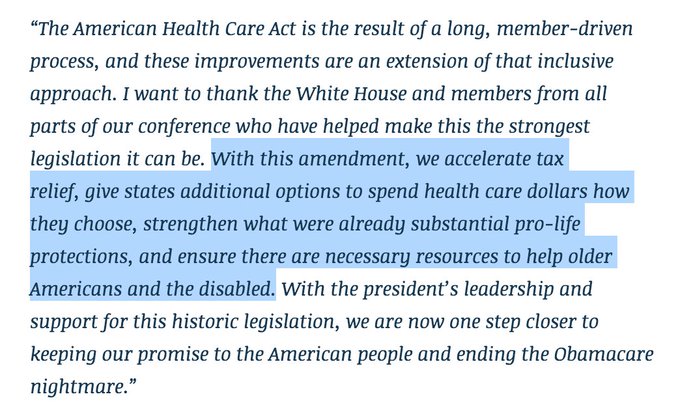
Alan: The non-partisan Congressional Budget Office says Trumpcare will cause 24 million Americans to lose health insurance.
Yet fewer than half of Americans surveyed thought the GOP alternative will result in fewer people having health insurance.
WASHINGTON — Republicans released a modified health care bill Monday in an attempt to shore up support among both conservatives and moderates for their legislation to replace the Affordable Care Act before the House votes Thursday — seven years to the day after President Obama signed the act.
Under the modified version of the GOP replacement bill, states would be allowed to require able-bodied Medicaid recipients without dependents to work beginning in October — and would get a funding boost as a reward for doing so. States could also receive federal funding for the program as a lump sum — instead of a per capita allotment — for children and non-disabled, non-elderly adults.
Taxes imposed by the ACA on the wealthy, sectors of the health care industry and others to pay for expanded coverage would be repealed in 2017 instead of 2018.
Those changes were made to draw support from conservative members disappointed the original bill didn’t go far enough to undo the ACA, popularly known as Obamacare.
“There are several groups where it addresses their concerns, that’s why we’re doing this,” said Rep. Pete Sessions, the Texas Republican who heads the House Rules Committee, which will take up the legislation Wednesday,
Republicans also said the changes will allow the Senate to expand subsidies for older people who buy coverage on the individual market. That would help offset the premium increases they’ll see once insurers are allowed to charge them five times as much as younger people for the same plan. The ACA limited the difference to three times as much and AARP has mounted a strong opposition to the GOP bill. Other groups opposing the GOP bill include associations representing doctors, nurses and hospitals.
Read more:
Despite the changes, it’s uncertain if the bill can garner enough Republican votes to pass the House. Democrats are united in their opposition to the bill.
Michigan Rep. Justin Amash, one of the bill's staunchest critics, tweeted that the revised version won't garner enough support to pass.
But in a good sign for Republicans, the House Freedom Caucus announced Monday it would not take a united position on the bill. The conservative group has enough members to stop legislation if it votes as a bloc, and many members still may vote against it.
The revised bill did not include an updated analysis from the nonpartisan Congressional Budget Office on its cost and effect on insurance coverage.
The CBO estimated that, under the original version of the bill, the number of uninsured would grow by 24 million in 10 years. Much of that would come from reductions in Medicaid spending, though CBO also predicted millions of people would drop coverage once they are no longer required to have it.
Larry Levitt, senior vice president at the nonpartisan Kaiser Family Foundation, tweeted the CBO's estimate is unlikely to change.
The CBO also projected premiums for people who don’t qualify for a government program and aren’t offered coverage through an employer are likely to be higher under the GOP bill than under the Affordable Care Act because fewer healthy people would buy insurance after Republicans eliminate the ACA’s tax penalty for not having insurance.
But by 2026, premiums would be about 10% lower than projected under the ACA. That’s because the pool of people being covered is expected to be younger, because insurers could cover a lower share of health care costs than under the current law, and because the bill includes funds for states which could help reduce premiums.
But premium changes would vary by age with costs going down for younger customers and up for older ones.
White House spokesman Sean Spicer said Monday the bill is being changed “in large part because we’ve been listening and making it better.”
"To the extent that we can make changes that I think enable us to maintain 218 votes (in the House), we will do that,” Spicer said.
Republicans can afford only about 20 GOP defections in the House and two in the Senate where several Republicans are opposed, including Kentucky Sen. Rand Paul.
Speaking at a rally in Louisville Monday night, Trump said he looks forward to working with Paul and suggested more changes to the bill are coming.
"We’re going to negotiate. It’s going to go to the Senate and back and forth," Trump said. "The end result is going to be wonderful. And it’s going to work great."
Trump is expected to meet with Capitol Hill Republicans Tuesday to urge their support.
The public remains split over whether Congress should repeal the ACA. A bare majority — 51% — oppose repeal while 45% are in favor, according to a March 6-12 survey conducted for the Kaiser Family Foundation. Nearly half of those surveyed thought the GOP alternative will result in fewer people having health insurance.
Ohio Rep. Steve Chabot, who was waiting for the changes before deciding if he will vote for the bill, suggested Monday Thursday’s timeline for a floor vote might slip if the votes aren’t there.
“It would be a disaster if they brought it up and it failed,” Chabot said earlier in the day. “I think they still have some work to do.”
Contributing: Eliza Collins, Deidre Shesgreen, Donovan Slack, USA TODAY.
Read more:





No comments:
Post a Comment